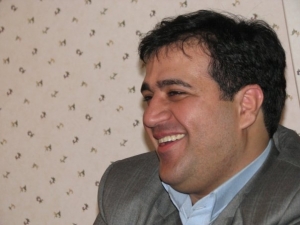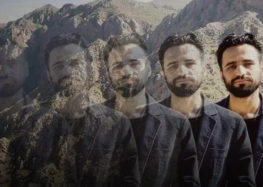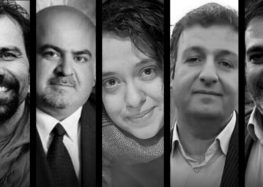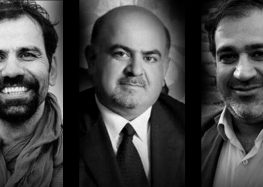Imprisoned Journalist Awaits Surgery After Nine Months
 Mehdi Mahmoudian, an imprisoned journalist and member of the Participation Front political party, was transferred from Rajaee Shahr Prison to a hospital in May 2011 and will undergo surgery Thursday morning. In an interview with the International Campaign for Human Rights in Iran, a source close to the prisoner who asked for anonymity for security reasons said, “Mehdi suffers from serious blood pressure fluctuations and keeps having seizures. Only since yesterday have the doctors been able to stabilize his blood pressure. He will undergo surgery on Thursday. Finally, a whole year after his illness and his requests for treatment, the Tehran Prosecutor gave him permission to leave prison.”
Mehdi Mahmoudian, an imprisoned journalist and member of the Participation Front political party, was transferred from Rajaee Shahr Prison to a hospital in May 2011 and will undergo surgery Thursday morning. In an interview with the International Campaign for Human Rights in Iran, a source close to the prisoner who asked for anonymity for security reasons said, “Mehdi suffers from serious blood pressure fluctuations and keeps having seizures. Only since yesterday have the doctors been able to stabilize his blood pressure. He will undergo surgery on Thursday. Finally, a whole year after his illness and his requests for treatment, the Tehran Prosecutor gave him permission to leave prison.”
Mahmoudian, one of the individuals responsible for disseminating information about the events at Kahrizak Detention Center, was arrested on 16 September 2009 at his home. He was initially detained at Evin Prison, but was moved to Rajaee Shahr Prison in Karaj. Mahmoudian was sentenced to five years in prison on the charge of “assembly and collusion against the regime.” He wrote a letter to Iran’s Supreme Leader about the horrific prison conditions, including the occurrence of rape, at Rajaee Shahr Prison.
“When he was in Evin’s Ward 209, on many nights they sent him to the prison yard without any clothes. This was in December when it was very cold and he spent many nights until morning under the rain. He developed respiratory problems since then and complained numerous times, asking to be sent out of prison for treatment. The Evin Prison infirmary did not even give him medicine. After a while the prison guards wanted to transfer him to a hospital with foot cuffs, but he did not agree to being transferred like this,” the source told the Campaign.
“Mehdi’s situation kept worsening in Rajaee Shahr Prison, until finally last May they transferred him to the hospital. According to the doctors, he has lost a large part of his lung capacity and there is nothing that can be done for him. He will have to live with his half lung now. But since last December, he also developed a fluctuating blood pressure, to the point where several hours each day he would lose consciousness. Prison doctors said that he needs an immediate brain scan and must be immediately transferred to the hospital, but in order to leave the prison he needed permission from the Prosecutor. It took nine months to receive this permission. His transfer was further delayed for a month because they wanted to take him to prison with foot cuffs and Mehdi resisted this, until the prison authorities agree to transfer him without foot cuffs,” the source added.
According to this source, many political prisoners at the Rajaee Shahr Prison are also suffering from poor prison conditions.
“The political prisoners’ ward of the Rajaee Shahr Prison has 30 rooms that are 2 square meters each and are situated along a large corridor. There are no exits at the beginning or end of the corridor, and the prisoners have no contact with each other. This ward houses 60 political prisoners who are forced to spend 21 hours a day next to each other in a cramped space without any connection to the outside world. During the day, the prisoners are allowed only three hours of fresh air. In the cold and hot seasons the time spent outside is during the coldest or hottest times of the day, during which most prisoners do not want to leave their cells. Also, contrary to the procedures that allow prisoners to write to their families twice per month, none of their letters ever reach their families, and after several months the letters are returned to the prirsoners undelivered,” the source said. Many of the political prisoners at this prison have remained unidentified, and up until now the media had not spoken to their families, according to the source. The prisoners are subjected to extra mistreatment and harassment. Many have been beaten and insulted by other prisoners and prison authorities.
The source told the Campaign that prison authorities have commissioned prisoners to beat imprisoned student Ali Ajami many times, causing black bruises under Ajami’s eyes and on his face. Prison authorities not only failed to investigate his complaints but they transferred him to solitary confinement after he complained.
The source added that Issa Saharkhiz, also imprisoned in Rajaee Shahr Prison, is not in good condition and has been assaulted by the other prisoners many times. Previously, prison physicians told him that he might have cancer and that he must be tested for it, but it took three months before he was taken for testing. “Rajaee Shahr Prison is well known to be the worst prison in Iran, but apparently they have made the conditions even worse for political prisoners. They have made a hell inside another hell for them.”
“The prisoners have no in-person visitation, and if they ever are lucky enough and get a visit, in reality it is a behind-the-wall visit, meaning they are not allowed to shake hands or kiss their visitors, something similar to a cabin visit,” the source said.





